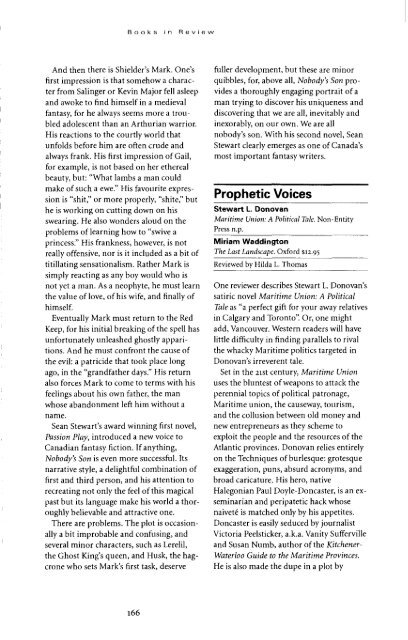The Carpathians - University of British Columbia
The Carpathians - University of British Columbia
The Carpathians - University of British Columbia
You also want an ePaper? Increase the reach of your titles
YUMPU automatically turns print PDFs into web optimized ePapers that Google loves.
And then there is Shielder's Mark. One's<br />
first impression is that somehow a character<br />
from Salinger or Kevin Major fell asleep<br />
and awoke to find himself in a medieval<br />
fantasy, for he always seems more a troubled<br />
adolescent than an Arthurian warrior.<br />
His reactions to the courtly world that<br />
unfolds before him are <strong>of</strong>ten crude and<br />
always frank. His first impression <strong>of</strong> Gail,<br />
for example, is not based on her ethereal<br />
beauty, but: "What lambs a man could<br />
make <strong>of</strong> such a ewe." His favourite expression<br />
is "shit," or more properly, "shite," but<br />
he is working on cutting down on his<br />
swearing. He also wonders aloud on the<br />
problems <strong>of</strong> learning how to "swive a<br />
princess." His frankness, however, is not<br />
really <strong>of</strong>fensive, nor is it included as a bit <strong>of</strong><br />
titillating sensationalism. Rather Mark is<br />
simply reacting as any boy would who is<br />
not yet a man. As a neophyte, he must learn<br />
the value <strong>of</strong> love, <strong>of</strong> his wife, and finally <strong>of</strong><br />
himself.<br />
Eventually Mark must return to the Red<br />
Keep, for his initial breaking <strong>of</strong> the spell has<br />
unfortunately unleashed ghostly apparitions.<br />
And he must confront the cause <strong>of</strong><br />
the evil: a patricide that took place long<br />
ago, in the "grandfather days." His return<br />
also forces Mark to come to terms with his<br />
feelings about his own father, the man<br />
whose abandonment left him without a<br />
name.<br />
Sean Stewart's award winning first novel,<br />
Passion Play, introduced a new voice to<br />
Canadian fantasy fiction. If anything,<br />
Nobody's Son is even more successful. Its<br />
narrative style, a delightful combination <strong>of</strong><br />
first and third person, and his attention to<br />
recreating not only the feel <strong>of</strong> this magical<br />
past but its language make his world a thoroughly<br />
believable and attractive one.<br />
<strong>The</strong>re are problems. <strong>The</strong> plot is occasionally<br />
a bit improbable and confusing, and<br />
several minor characters, such as Lerelil,<br />
the Ghost King's queen, and Husk, the hagcrone<br />
who sets Mark's first task, deserve<br />
fuller development, but these are minor<br />
quibbles, for, above all, Nobody's Son provides<br />
a thoroughly engaging portrait <strong>of</strong> a<br />
man trying to discover his uniqueness and<br />
discovering that we are all, inevitably and<br />
inexorably, on our own. We are all<br />
nobody's son. With his second novel, Sean<br />
Stewart clearly emerges as one <strong>of</strong> Canada's<br />
most important fantasy writers.<br />
Prophetic Voices<br />
Stewart L. Donovan<br />
Maritime Union: A Political Tale. Non-Entity<br />
Press n.p.<br />
Miriam Waddington<br />
<strong>The</strong> Last Landscape. Oxford $12.95<br />
Reviewed by Hilda L. Thomas<br />
One reviewer describes Stewart L. Donovan's<br />
satiric novel Maritime Union: A Political<br />
Tale as "a perfect gift for your away relatives<br />
in Calgary and Toronto". Or, one might<br />
add, Vancouver. Western readers will have<br />
little difficulty in finding parallels to rival<br />
the whacky Maritime politics targeted in<br />
Donovan's irreverent tale.<br />
Set in the 21st century, Maritime Union<br />
uses the bluntest <strong>of</strong> weapons to attack the<br />
perennial topics <strong>of</strong> political patronage,<br />
Maritime union, the causeway, tourism,<br />
and the collusion between old money and<br />
new entrepreneurs as they scheme to<br />
exploit the people and the resources <strong>of</strong> the<br />
Atlantic provinces. Donovan relies entirely<br />
on the Techniques <strong>of</strong> burlesque: grotesque<br />
exaggeration, puns, absurd acronyms, and<br />
broad caricature. His hero, native<br />
Halegonian Paul Doyle-Doncaster, is an exseminarian<br />
and peripatetic hack whose<br />
naivete is matched only by his appetites.<br />
Doncaster is easily seduced by journalist<br />
Victoria Peelsticker, a.k.a. Vanity Sufferville<br />
and Susan Numb, author <strong>of</strong> the Kitchener-<br />
Waterloo Guide to the Maritime Provinces.<br />
He is also made the dupe in a plot by

















